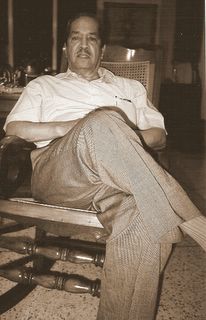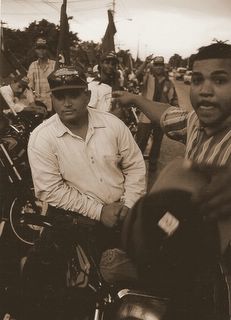 By David Abel | Globe Correspondent | 11/26/1999
By David Abel | Globe Correspondent | 11/26/1999SANTO DOMINGO, Dominican Republic - Mario Read Vittini wants to be this country's next president. The 73-year-old author and former ambassador to the United States, however, knows his chances of winning his party's nomination are next to nil.
That's because his old boss and the longtime ruler of this poor Caribbean nation will not relinquish the reins of their conservative Social Christian Reform Party. Even though Joaquin Balaguer is blind, ailing, and will turn 94 before May's presidential election, the man who mustered seven terms as president still calls his party's shots, three years after leaving office.
Balaguer has also begun plastering billboards and banners around the country with slogans proclaiming: "One more time for necessity," and "A president for two centuries."
Read Vittini hasn't given up hope. Balaguer is yet to officially declare his candidacy. And although Vittini is aware of his old boss's influence, he said he may be able to persuade friends in the party to give him a fair chance before the Reform Party nominates a candidate in January.
"I don't deny Balaguer the right to run," Read Vittini said from his home. "But he's robbing the ranks of what our party has to offer. By taking the nomination without a process, without a primary, he's committing another fraud to secure his candidacy."
Through his 22 years in power, Balaguer's rule was marked by corruption, coup attempts, lavish public works projects, dubious elections, and repression of leftists. Balaguer first took office briefly in 1960, when he was tapped by his mentor and the Dominican Republic's previous longtime leader, Rafael Trujillo.
More recently, Balaguer was forced to step down after he was accused of stealing the 1994 election. The corruption was deemed so outrageous the Congress passed a constitutional amendment to prevent him from seeking the presidency in 1996. The law barred the chief executive from serving a second consecutive term.
Nevertheless, the ex-president, who has long been supported by the poor for his public works projects, played the role of kingmaker in 1996, throwing his weight behind the country's current leader, Leonel Fernandez. Three years later, however, Balaguer looms as a presidential candidate. The law that prevented Balaguer from running in 1996 blocks Fernandez from reelection.
Ensconced in a large home guarded by soldiers with automatic weapons, Balaguer remains a potential candidate, still only teasing voters from behind the gates he seldom leaves. Although he declined an interview, his close advisers said they expect him to run. And while they acknowledge he may not win, few doubt Balaguer will play a decisive role in crowning the victor.
"To whichever side Balaguer leans is likely to win," said Jorge Suncar, a commentator for "Hola," a morning TV show. "About 25 percent of the population is not affiliated to a specific party, and many of those may vote for Balaguer, on top of his traditional base."
To be elected president, a candidate must gain a majority. Otherwise, a runoff between the top two candidates is held.
Members of the governing Liberation Party
 said they expect Balaguer's standing to rise in the polls. "We hope that Balaguer runs," said Roberto Sanchez, a party organizer. "It looks like we won't win in the first round, and we think he will give us his support."
said they expect Balaguer's standing to rise in the polls. "We hope that Balaguer runs," said Roberto Sanchez, a party organizer. "It looks like we won't win in the first round, and we think he will give us his support."Read Vittini said he has had enough of living under Balaguer's shadow. He served for decades as one of the former president's confidants. But that ended with Read Vittini's firing in 1994, after his star got too bright. He said he was told he took too much credit for renegotiating the Dominican Republic's debt to the United States.
But, like Balaguer, he hasn't lost the flame to run his country's affairs and he vows to fight his old boss.
"Balaguer doesn't like to be challenged, but I am challenging him," he said. "He wants to be the chief politician for the rest of his life. He wants to die being president."
David Abel can be reached at dabel@globe.com.
Copyright, The Boston Globe

